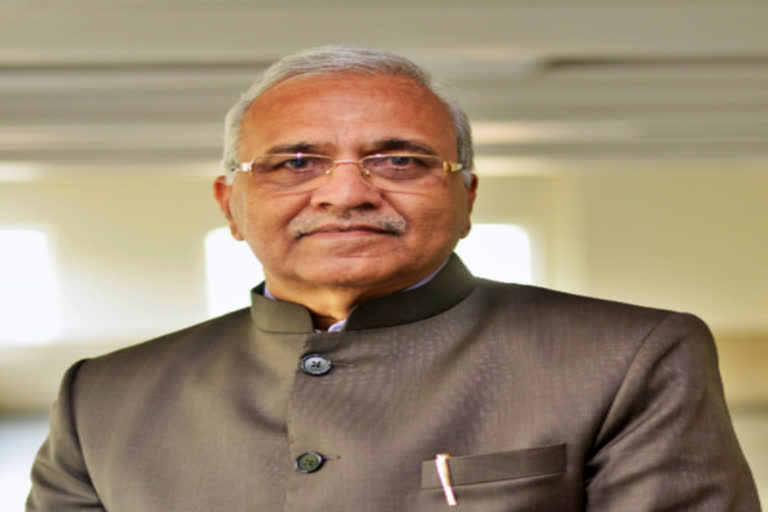New Delhi: As India crossed 1,12,000 lakh COVID-19 cases on Thursday, the Association of Healthcare Providers-India (AHPI) has expressed serious concern on the variation in response by various states.
"Major concern at this moment is the variations in response by various states. In Maharashtra we are having 12 per cent positive cases whereas in Karnataka and Odisha it is less than 1 per cent," said Dr Giridhar Gyani, Director General to Association of Healthcare Providers - India in an exclusive interview to ETV Bharat.
Maharashtra registered at least 40,000 Covid cases, Tamil Nadu near about 14,000 whereas states like Karnataka registered 1,500 cases and Odisha 1000 Covid cases.
"There should be a study following India's more than 1 lakh Covid 19 testing per day, why such variations," said Dr Gyani. Admitting the fact that Covid cases are increasing on every alternate day in India, Dr Gyani said that by May end the total case may cross 1.5 lakh.
"But we have a good recovery rate. And it has touched 40 per cent as on today. So by May end, the recovery rate may cross 50 per cent," said Dr Gyani. As per health ministry records 45299 people have been cured till date in India from COVID-19. He, however, ruled out the possibility that Indian will ever enter into stage 3 of the pandemic which is community transmission.
"Our recovery rate is high and COVID-19 is confirmed to limited containment zones at present...we need to follow lockdown and other social distancing guidelines," said Dr Gyani.
He also expressed concern over the movements of migrant workers. "It seems there is a hurry to transport migrant workers. However, in the process, we may compromise with social distancing norms. If there are asymptomatic people among the migrants, the cases may spread to other too," said Dr Gyani adding "we should not forget that COVID-19 has not yet gone from India."
Also read: Defence manufacturing affected by COVID-19: Rajnath Singh
His statements assume significance following the fact that many states like Assam, Gujarat among others are registering fresh cases following the return of migrants in their states. Dr Gyani also commented on India's proactive approach taken against COVID-19.
"Central government imposed strong lockdown measures and states abide them. Our people are also sensible. However, in many other countries, the coordination was not there. In America different states are adopting different measures," Dr Gyani said. He further said that when India withdraws lockdown, there should be different guidelines and protocols for different sectors and industries.
"Government needs to create separate SOPs for restaurants, transport and communications and other industries...and containment zones should be under guard when India withdraws lockdown, " said Dr Gyani. It may be mentioned here that AHPI represents the majority of the healthcare providers in India.
Meanwhile, India's 555 COVID-19 testing labs have tested more than 26,15,920 cases till date. The Indian Council of Medical Research (ICMR) along with central and state government as well as National Centre for Disease Control (NCDC) is conducting a community-based survey to estimate the prevalence of COVID-19 infection in Indian population.
At present India has 3027 dedicated Covid hospitals and Covid health care centres, 7013 Covid care centres with 2.81 lakh isolation beds, 31250 ICU beds, 109888 oxygen supported beds. Nearly 3 lakh PPEs and 3 lakh N95 masks are now being manufactures in India.
An analysis of the COVID-19 death cases (3435) indicates that 64 per cent of deaths in males and 36 per cent in females. In terms of age distribution, 0.5 per cent deaths are reported in less than 15 years age group, 2.5 per cent 15-30 years age group, 11.4 per cent in 30-45 years age group, 35.1 per cent in 45-60 years age group and 50.5 per cent in above 60 years age group. 73 per cent of death cases had underlying co-morbidities.
Also read: We are going to announce resumption of more train services in upcoming days: Piyush Goyal
Interestingly, a team of researchers from Jawaharlal Nehru Centre for Advanced Scientific Research (JNCASR) along with collaborators from IISc Bengaluru have developed a heuristic predictive model for COVID-19 that provides short term predictions about the evolution of the disease and the medical needs that are generated as a consequence. The Department of Biotechnology and other related departments are working together to find a vaccine for COVID-19.
Meanwhile, addressing an Ayushman Bharat webinar, Health Minister Dr Harsh Vardhan said that 1 crore treatments have been provided to the needy people with under Ayushman Bharat Pradhan Mantri Jan Arogya Yojana. "These treatments worth Rs 13,412 crore have been provided through a growing network of the 21,565 public and private empanelled hospitals," said Dr Vardhan.



